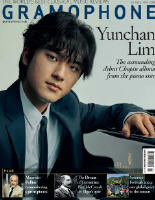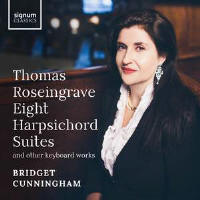Texte paru dans: / Appeared in:
Signum
Référence: SIGCD783
|
|||||||
|
|
|||||||
|
Reviewer : Philip Kennicott Young Thomas Roseingrave, descended from a family of musicians in Ireland and England, visited Venice in the early 18th century and encountered there Domenico Scarlatti. He was entranced by what he heard. Bridget Cunningham’s booklet notes for her new recording of Roseingrave’s keyboard suites cite Charles Burney to finish the story: ‘A grave young man dressed in black and in a black wig, who had stood in one corner of the room, very quiet and attentive while Roseingrave played, being asked to sit down to the harpsichord, when he began to play, Roseingrave said he thought ten hundred devils had been at the instrument; he never heard such passages of execution and effect before.’Roseingrave was disturbed by the encounter but also inspired, and he went on to champion Scarlatti’s music in London. Scarlatti’s influence isn’t readily detected in Roseingrave’s output except, perhaps, in some of the more virtuoso demands of the eight suites and miscellaneous works, including some wide skips in thirds that give the opening of his Celebrated Concerto in D propulsive energy.
Rather, Handel seems a more pervasive influence in both the keyboard-writing and its harmonic restlessness. The suites are in four or five movements and rarely stray from the standard four or five dances favoured at the time: Allemande, Courante, Sarabande, Gigue. But there are many lovely moments, especially a Gallic piquancy to some of the harmonies that suggests, at times, the language of Rameau, as in the darkly melancholy F minor Suite No 5.
Cunningham can be a fussy player and I found myself wishing she would get out of the way of the music’s natural vivacity and flow. There is a choppiness to the interpretations, sometimes the result of breaking down phrases into deliberate two- and four-note divisions. The ornamentation is orthodox and unobjectionable but it, too, wants more smoothness and greater ease of execution. At times, the technical challenges felt not entirely under control.
But this two-CD set will put this music before a wider audience and invite other champions. Any one of these suites could be happily added to a programme of Handel’s keyboard works without any embarrassment to the lesser-known and unfortunately neglected Roseingrave. |
|||||||
|
|||||||
|
|
|
||||||
|
Cliquez l'un ou l'autre
bouton pour découvrir bien d'autres critiques de CD |
|||||||




